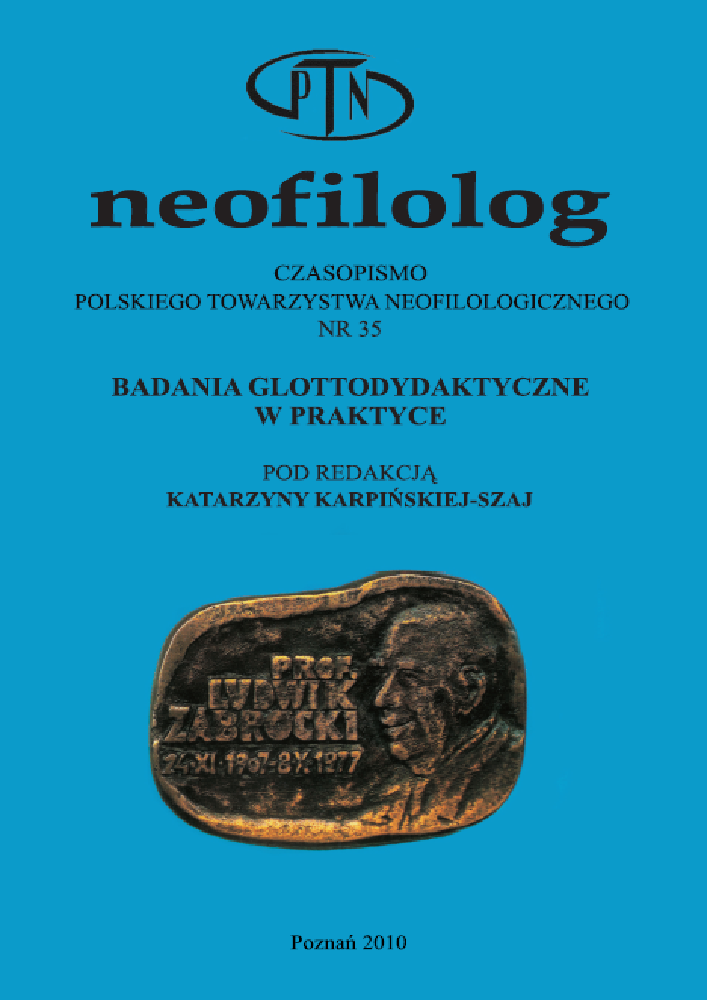Résumé
The paper addresses the emergence of interdisciplinarity in humanities research. In the first section, it looks at various conceptions of interdisciplinarity. Then, it discusses an interdisciplinary nature of reading research,
overviewing the concept of reading as explored by different fields of science. Finally, as an example of an interdisciplinary study into reading comprehension, the study conducted by the author of the paper is presented. The process of planning and the initial stages of conducting the study are discussed, along with the advantages of drawing on several disciplines in the study.
Références
Barton, D. 1994. Literacy. Oxford: Blackwell.
Białecki, I. 1996. „Alfabetyzm funkcjonalny”. Res Publica 6: 68-76.
Britton, B.K. 1994. „Understanding expository text. Building mental structures to induce insights” (w) Handbook of psycholinguistics (red. Morton A. Gernsbacher). San Diego: Academic Press: 641-674.
Block, E.L. 1986. „See how they read: comprehension monitoring of L1 and L2 readers”. TESOL Quarterly 26(2): 319-343.
Chodkiewicz, H. 2000. Vocabulary acquisition from the written context. Inferring word meaning by Polish learners of English. Lublin: Maria Curie-Skłodowska University Press.
Dijk van, T.A. i W. Kintsch. 1983. Strategies of discourse comprehension. New York: Academic Press.
Droździał-Szelest, K. 1997. Language learning strategies in the process of acquiring a foreign language. Poznań: Motivex.
Eco, U. 2007. Sześć przechadzek po lesie fikcji. Kraków: Wydawnictwo Znak.
Gernsbacher, M.A. 1990. Language comprehension as structure building. Hillsdale: N.J.: Lawrence Erlbaum Associates.
Halliday, M.A.K. i R. Hasan. 1985. Language, context and text: Aspects of language in a social – semiotic perspective. Victoria: Deakin University Press.
Hobot, J. 2004. „Poststrukturalne kierunki badawcze w szkolnej praktyce polonistycznej, czyli o związkach teorii literatury i metodyki” (w) Polonista w szkole. Podstawy kształcenia nauczyciela polonisty (red. A. Janus-Sitarz). Kraków: Universitas: 173-189.
Hosenfeld, C. 1977. „A preliminary investigation of the reading strategies of successful and non-successful second language learners”. System 5(2): 110-123.
Iser, W. 1976. The act of reading. Baltimore: The Johns Hopkins University Press.
Johns, A.M. 1997. Text, role and context. Developing academic literacies. Cambridge: Cambridge University Press.
Kloch, Z. 2007. Interdyscyplinarność w naukach humanistycznych – Tekst wygłoszony na ogólnopolskiej konferencji „Interdyscyplinarność w naukach społecznych – możliwość czy powinność” zorganizowanej w Instytucie Filozofii i Socjologii PAN (21 listopada 2007). http://www.obta.uw.edu.pl/pl/node/61DW 13.10.2009.
Konarzewski, K. 2002. Jak uprawiać badania oświatowe. Metodologia praktyczna. Warszawa: Wydawnictwo Szkolne i Pedagogiczne.
Kowalikowa, J. 2004. „Tekst cudzy – tekst własny” (w) Przygotowanie ucznia do odbioru różnych tekstów kultury (red. A. Janus-Sitarz). Kraków: Universitas: 15-53.
Kusiak, M. i E. Bandura. 2007. „Facilitating educated talk while working with written texts in an academic foreign language classroom” (w) PASE Papers 2007. Vol. 1: Studies in language and methodology of teaching foreign languages (red. J. Arabski, D. Gabryś-Barker i A. Łyda). Katowice: University of Silesia: 309-328.
McCormick, K. 1994. The culture of reading and the teaching of English. Manchester: Manchester University Press.
Mosorska, E. i B. Wojciechowska. 2008. „Rzetelność i efektywność badań rozwoju osobistej kompetencji komunikacyjnej w ustnych interakcjach obcojęzycznych”. Neofilolog 31: 41-49.
Myrdzik, B. 1996. „O hermeneutyce w perspektywie edukacji polonistycznej (część II)”. Język polski w szkole średniej 4 (1995/1996): 45-51.
Nycz, R. 2006. „Wprowadzenie” (w) Kulturowa teoria literatury. Główne pojęcia i problemy (red. M. P. Markowski i R. Nycz). Kraków: Universitas: 5-38.
Pilch, A. 2004. „Hermeneutyka jako metoda interpretowania tekstów poetyckich” (w) Polonista w szkole. Podstawy kształcenia nauczyciela polonisty (red. A. Janus-Sitarz). Kraków: Universitas: 191-215.
Ricoeur, P. 1989. Język, tekst, interpretacja. Warszawa: PIW.
Wallace, C. 2005. Critical reading in language education. London: Palgrave. Macmillan.
Wilczyńska, W. 2002. Autonomizacja w dydaktyce języków obcych. Doskonalenie się w komunikacji ustnej. Poznań: Wydawnictwo Naukowe UAM.
Wilkoń, A. 2002. Spójność i struktura tekstu. Kraków: Universitas.
Żydek-Bednarczuk, U. 2005. Wprowadzenie do lingwistycznej analizy tekstu. Kraków: Universitas.
Licence
© Monika Kusiak 2010

Ce travail est disponible sous licence Creative Commons Attribution - Pas de Modification 4.0 International.
Auteurs :
Les auteurs de textes acceptés pour publication dans la revue Neofilolog sont tenus de remplir, signer et renvoyer à l'adresse de la rédaction, un accord sur l'octroi d'une licence gratuite pour les œuvres, avec obligation d'accorder une sous-licence CC.
En vertu de cet accord, les auteurs des textes publiés dans la revue Neofilolog accordent à l'Université Adam Mickiewicz de Poznań une licence non exclusive et gratuite et permettent l'utilisation de la sous-licence Creative Commons Attribution-NoDerivatives 4.0 International (CC BY-ND 4.0).
Les auteurs se réservent le droit de disposer librement de l'œuvre.
Utilisateurs :
Les utilisateurs d'Internet intéressés ont le droit d'utiliser les œuvres publiées à partir de l'année 2017 sous réserve des conditions suivantes :
- reconnaissance de la qualité d'auteur - l'obligation de fournir des informations sur la qualité d'auteur, le titre, la source (liens vers l'œuvre originale, DOI) et la licence, ainsi que l'œuvre distribuée ;
- sans créer d'œuvres dérivées - l'œuvre doit être conservée dans sa forme originale, p. ex. les traductions ou les interprétations ne peuvent être distribuées sans le consentement de l'auteur.
Tous les textes publiés sont soumis au droit d'auteur.
Autres :
L'Université Adam Mickiewicz de Poznań se réserve le droit à la revue dans son ensemble (mise en page, forme graphique, titre, conception de la couverture, logo, etc.).
.
